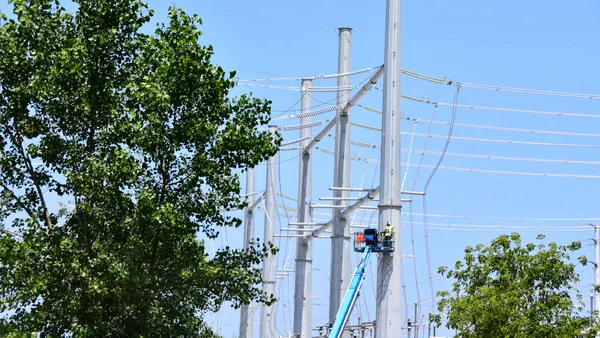Dive Brief:
- Rhode Island energy officials say the state's efforts to modernize its electric grid will be a "complex undertaking" as well as a "huge opportunity" that ultimately will help control costs, while creating a more resilient and cleaner system.
- The state's energy agencies Nov. 17 submitted to Gov. Gina Raimondo (D) a report outlining steps to overhaul Rhode Island's electrical grid, with a focus on controlling costs, integrating more green power, improving service and overhauling utility incentive models.
- The report, "Rhode Island Power Sector Transformation," lays out a roadmap to foster customer participation and choice, while enabling the efficient integration of additional clean energy technologies like battery storage and energy management solutions.
Dive Insight:
Energy officials in the Ocean State acknowledged last week that the path to a more stable, flexible and green grid will be a complex process — given the commitment to controlling costs — but will also be a boon to the state as it embraces the new clean energy economy.
"Transforming Rhode Island's electric grid will be a complex undertaking, but the recommendations in this report are a critical first step," state Energy Commissioner Carol Grant said in a statement.
While several states have launched similar proceedings, led by California, New York and Hawaii, Grant said that "few states in the nation have progressed as far in this work as Rhode Island has. While we have more work ahead of us, I am confident that the strategies outlined in this report can advance the economic, energy and environmental interests of our state."
The blueprint focuses on five areas: controlling long-term costs; customer choice; grid flexibility; new utility earnings models; and increased reliability.
Rhode Island's grid, like all others, was originally constructed when electricity flows only went one way, according to Macky McCleary, administrator of the Rhode Island Division of Public Utilities and Carriers.
"Today, with the addition of renewable energy systems throughout the grid, that electricity flows both ways," McCleary said. "This presents a huge opportunity for us to rethink how we regulate and incentivize grid improvements, while giving consumers more control over their energy choices and usage."
Officials said the 90-page report's recommendations are the result of a seven-month process that ran from February through September 2017, and brought together more than 200 individuals and 65 organizations who provided input on draft proposals.
"Power sector transformation in Rhode Island could really be a game changer for how we look at — and interact with — the grid of the future," Grant said.
The report lays out a series of goals, including for Rhode Island consumers to have access to commercial products capable of lowering their energy bills and empowering them with more control, while also developing 1,000 MW of clean energy by 2020.
One key to the proposals will be the state's focus on grid-based business models, possibly akin to work New York has done with its Reforming the Energy Vision initiative.
"The rapid advancement of information management, communications, power distribution, and consumer products have shown the potential to transform our electrical grid," the report concludes. But it notes "that potential can be unleashed only by reforming regulatory frameworks that today inhibit the utility from pursuing new technologies and limit the ability of third-party businesses from selling their innovative technologies and services to customers."
Officials say Rhode Island will examine the recommendations via a formal docketed proceeding at the PUC. Public comments can be submitted to [email protected].













